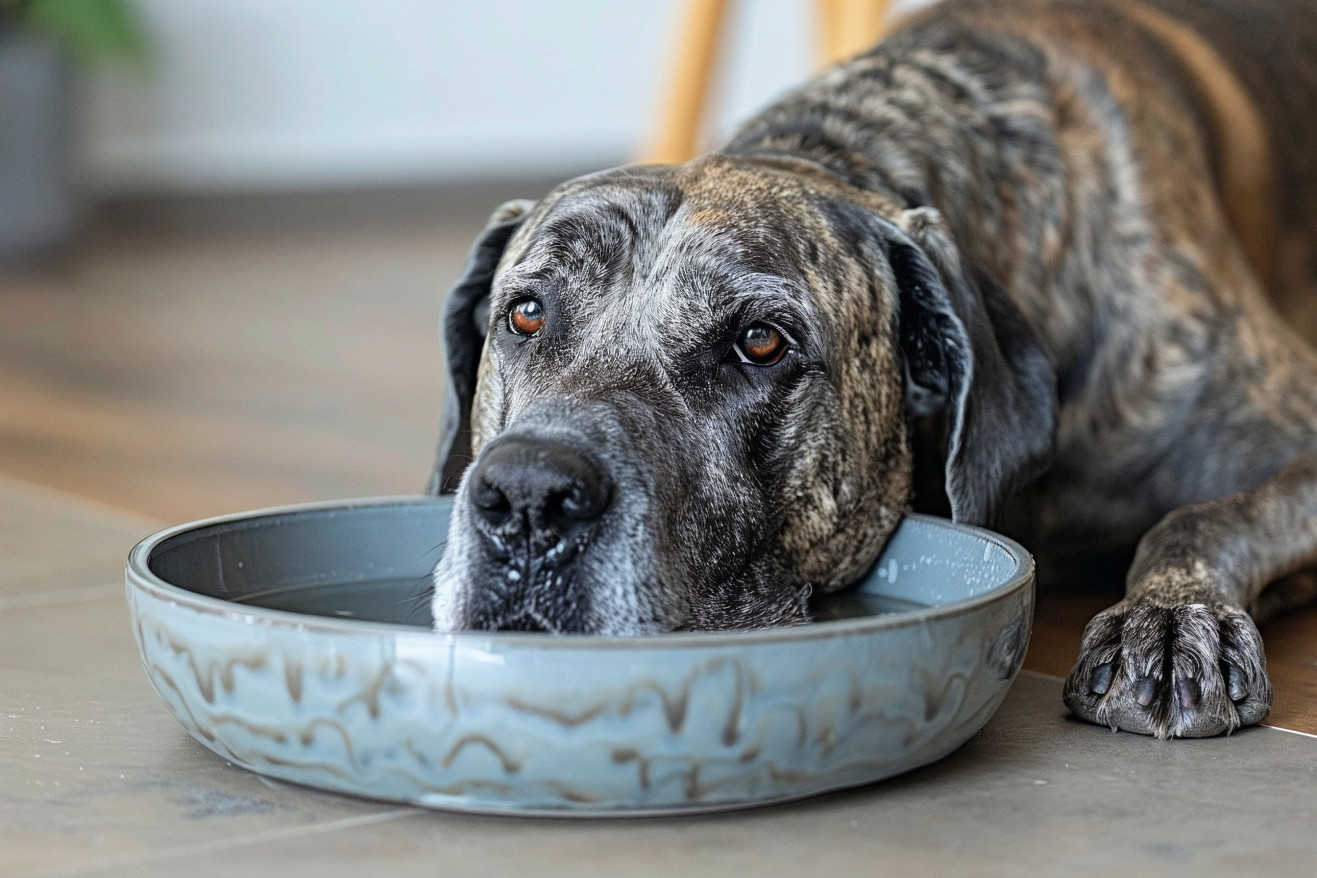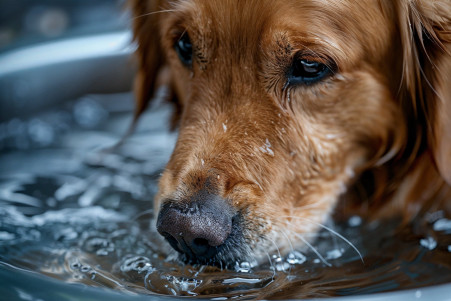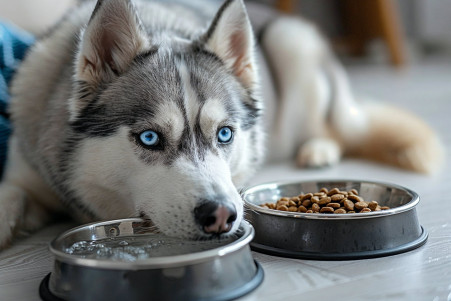Polydipsia in Older Dogs: Causes and What to Know
2 April 2024 • Updated 2 April 2024

How much water is too much for an older dog, and what might polydipsia indicate about an underlying health issue? Polydipsia, or excessive drinking, in older dogs is often a sign of an underlying condition such as diabetes, kidney disease, Cushing's disease, or a urinary tract infection that needs to be treated by a vet to resolve the issue and return hydration to normal levels.
Our investigation of this common issue in dogs will cover the potential causes of polydipsia and when it may be time to seek out diagnostic testing and treatment. From being a sign of a temporary issue like overheating to a more serious condition, we will cover the many reasons why dogs may experience an increase in thirst as they age. Armed with this information, you will know what to look for and how to make sure that you are keeping your loyal friend as healthy as possible.
What causes increased thirst in older dogs?
Common Causes of Increased Thirst in Senior Dogs
The reasons for increased thirst in older dogs can be due to a number of different medical issues. According to The Spruce Pets, diabetes, kidney disease, Cushing's disease, and urinary tract infections are some of the most common causes. In diabetes, glucose accumulates in the blood and is excreted in the urine, taking water with it. Kidney disease causes the kidneys to lose their ability to concentrate urine, which means more water is needed to excrete waste. Cushing's disease, an imbalance of hormones, often causes increased thirst and urination as well.
In addition to specific diseases, the aging process itself can lead to polydipsia (excessive drinking) in dogs. As dogs age, Heron's Crossing explains that age-related changes like decreased kidney function and hormonal changes can lead to a disruption in the body's ability to regulate water balance. Some medications, like diuretics or corticosteroids, can also cause increased thirst.
Environmental factors can also play a role. In hot weather or when a dog is dehydrated, dogs will drink more water to make up for the loss. However, if a dog's water intake is consistently high and there's no clear reason for it, it's important to have a veterinarian look into it. It's important to rule out more serious causes with diagnostic tests so that the issue can be properly addressed.
Diagnostic Testing to Find the Cause
If you have a senior dog that is drinking a lot of water, it's important to go to the vet right away. According to Hills Pet, the diagnostic process will typically start with a physical exam and some common screening tests, including a complete blood count, blood serum chemistry panel, and urinalysis. These tests can help to determine if there are any kidney issues, hormonal imbalances, or diabetes.
If the results of the initial tests show any abnormalities, VCA Animal Hospitals explains that there are a number of other tests that may be recommended, including diagnostic imaging and specialized hormone tests. These tests can help to determine if a dog has a condition like Cushing's disease, Addison's disease, or diabetes insipidus.
As Vetster stresses, it's important to make sure that you follow your vet's recommendations for diagnostic testing. This will help ensure that your dog is diagnosed properly and that they receive the right treatment. The goal is to find out what's causing the increased thirst, whether it's a chronic condition that can be managed or an acute condition that needs to be treated right away.
How Senior Dogs Are Treated and Cared for
The treatment of senior dogs with increased thirst will vary based on the specific cause that’s determined through diagnostic testing. For example, if diabetes or Cushing's disease is diagnosed, treatment will likely involve medication. The Vets notes that diabetes is typically treated with insulin injections, dietary changes, and weight management, while Cushing's disease can be managed with medications like Lysodren that help control cortisol levels.
If the cause is kidney-related, BetterVet says that treatment may include subcutaneous or intravenous fluid therapy to help with dehydration and maintain proper fluid balance. In addition, dietary changes, including the use of prescription kidney diets, may be recommended.
It’s also important to make sure that dogs are getting enough to drink. To help with this, WebMD recommends making sure that dogs have access to several water bowls that are easy to reach, keeping water cool, and taking water with you when dogs are outside and active. In addition, supplementing to help with dehydration and electrolyte imbalances can be helpful.
Regular monitoring and follow-up care will be needed to make sure that the condition is being managed and that the treatment plan is working. With the help of their vet, dog owners can make sure that their senior dogs are getting enough to drink and that the cause of their increased thirst is being treated.
Diet Changes to Help Manage Increased Thirst in Older Dogs
A well-balanced diet is important for helping senior dogs stay healthy and hydrated. VCA Animal Hospitals notes that there are several dietary changes that can be made to help manage increased thirst in older dogs. One of the most important is to increase the moisture in the food, which can be done by feeding canned, fresh, or raw diets. Other changes that can help include altering the amounts of protein, fat, and fiber in the food.
Many dog foods are specifically designed to meet the needs of senior dogs. Nom Nom suggests looking for foods with higher protein levels to help maintain muscle mass and with added ingredients like medium-chain triglycerides (MCTs), omega-3s, and antioxidants to help maintain cognitive health. In some cases, such as for senior dogs with kidney disease or diabetes, senior dogs may need to be fed a prescription diet that's lower in phosphorus or that meets other specific nutritional needs.
It's important to note, as Dog Chef points out, that it's important to work with a vet to make sure that a senior dog's diet is tailored to their specific needs and health. However, with the help of a vet, pet parents can come up with a plan that's tailored to their senior dog's needs and that helps manage increased thirst while supporting their overall health.
How to Keep Track of Your Senior Dog’s Water Intake
It’s important to monitor and keep track of your senior dog’s water intake, as changes in the amount of water they drink can be an early sign of other health issues, according to Purina. In general, dogs should drink between 40-60ml of water per kilogram of body weight per day. However, as Actijoy points out, this amount can vary for senior dogs based on their activity level, diet, and any medical conditions they may have.
You can monitor your senior dog’s water intake by using a specific water bowl or smart monitoring devices that can keep track of how much your dog is drinking. You can also keep a hydration diary or log to help you keep track of your dog’s water intake. According to Actijoy, it’s important to establish a baseline for your dog’s water intake when they’re younger so you can easily see if there are any changes as they get older.
If you notice that your senior dog is drinking more water than usual or that they’ve suddenly increased the amount of water they’re drinking, it’s important to let your vet know so they can investigate further. This way, they can get to the bottom of the issue and determine if there’s an underlying condition that needs to be treated.
Whether it’s a chronic condition that can be managed or an acute condition that needs to be treated right away, finding and treating the cause of the increased water intake can help ensure that your dog is able to stay properly hydrated and healthy in their senior years.
Conclusion: How to Help Your Senior Dog
Increased thirst in senior dogs can be a sign of several different health issues, including diabetes, kidney disease, and hormonal imbalances. Therefore, it's important to take your dog to the vet if you notice that they are drinking more water than usual.
In addition to seeking veterinary care, there are several things that you can do to help your senior dog stay healthy. For example, you can monitor your dog's water intake, make sure that they have access to fresh water at all times, and adjust their diet as needed.


